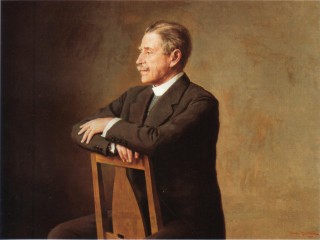
Verner Von Heidenstam biography
Date of birth : 1859-07-06
Date of death : 1940-05-20
Birthplace : Olshammar, Sweden
Nationality : Swedish
Category : Famous Figures
Last modified : 2011-01-26
Credited as : Author, poet and novelist, Nobel Prize in literature 1916
The Swedish author Carl Gustaf Verner von Heidenstam is known for his lyric poetry and historical novels. He received the 1916 Nobel Prize in literature.
Verner von Heidenstam was born on July 6, 1859, the son of aristocratic parents. Because of illness he was sent to the milder climate of the Middle East when he was 15. He returned to Sweden in 1887 and debuted the following year with a book of poetry, Pilgrimage and Wander-years, which made him famous. These poems stood in the sharpest contrast to the sober, pessimistic Swedish literature of the time. Heidenstam's poetry celebrated the joy of life and individualism. The exotic subject matter, taken from his years in the Orient and southern Europe, as well as the style, was virtually without precedent in Swedish literature.
In articles Heidenstam advocated a literature that combined fantasy, imagination, and a sense of the beautiful with a "bold, drastic realism." His call was quickly answered by young writers, some of whom, with Heidenstam, created a new golden age in Swedish poetry. In 1892 he published an autobiographical novel, Hans Alienus, in which the hero searches for an alternative to the hedonistic way of life Heidenstam had earlier celebrated. In his second volume of poetry, Dikter (1895), he moved toward nationalism.
Heidenstam's historical fiction begins with The Charles Men (1897-1898), stories concerning Charles XII's last years, one of the darkest periods in Swedish history. Heidenstam attempted to justify the self-sacrifice of the Swedes in following their King by showing that man achieves his greatest stature in moments of trial and suffering for his country. The Tree of the Folkungs (1905-1907), perhaps his greatest novel, is a study of an aristocratic Swedish state emerging from barbarism. Like all his historical novels, it is distinguished by powerful character portrayal and a sensuous evocation of the past.
Heidenstam dreamed of arousing in his countrymen some of the greatness of the past, which, he felt, was absent in a Sweden moving swiftly into the industrial age. But he failed in his role as "poet chieftain" and found himself more and more isolated from his times. His greatest collection of poems, Nya Dikter (1915), demonstrates a clear, classical form far different from his earlier poetry.
Except for a book of childhood memories published posthumously, Heidenstam wrote nothing in the last 25 years of his life. He died on May 20, 1940.
An anthology of Heidenstam's poetry is Sweden's Laureate: Selected Poems of Verner von Heidenstam, translated, with an introduction, by Charles W. Stork (1919). For further information in English see Alrik Gustafson, Six Scandinavian Novelists (1940; 2d ed. 1966) and A History of Swedish Literature (1961).
















